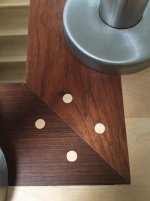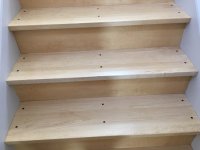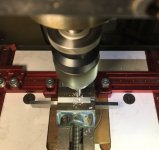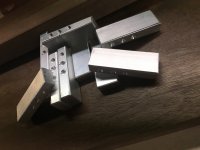Although it doesn't feature a carbide countersink, I wonder how Wolfcraft's (a.k.a Reisser's) German-made
2544000 3.2-12mm depth-stopped countersink stacks up?
It receives decent
reviews on
Amazon.de and is also available via
Amazon USA.
Then there are the various-sized Colt/Fisch/Riss French-made "Zeromark"
versions:
Famag also sells individual and a set of non-TCT depth-stopped countersinks (the latter of which, like the Fisch design, utilizes a single interchangeable depth stop and different sizes of counter sinks/pilot bits). However, Famag doesn't manufacture them. Instead, I'm guessing Fisch does given that the design of the Zeromark is patented and the Famag-branded version - brass depth stop not withstanding - looks incredibly similar to the Zeromark.
here's the relevant page in their latest catalog.
Alternatively, it might be possible to pair the correct size of the following Japanese-made Star-M depth stops (drill bits not included) with your existing countersink(s):
Either way, all of the above feature bearings that the stops spin on and are, depending on the make, about half (or, in the case of the Wolfcraft, even less than half) the cost of the Festool offerings. However, again, none feature carbide cutters. But, come to think of it, neither apparently do Festool's.
Amazon sells the Wolfcraft:
https://www.amazon.com/Wolfcraft-2544000-3-2-12mm-Starter-Countersink/dp/B002OHNH16#customerReviews
...as does the folllowing eBay seller:
https://www.ebay.com/itm/Wolfcraft-...32476385?epid=28012065012&hash=item238f90a3e1:g:m6QAAOSwrP9Z1783
The Colt & Riss offerings, however, are a little more difficult to find. There is one ebay.de seller that may, if asked, ship to the U.S.:
http://www.ebay.de/itm/Colt-Terasse...enker-n-Wahl/201961925985?hash=item2f05de6d61:m:mbDB8XJheuOMheROHm4cxgg
The differently named but identical product to the Colt version (known as the Risch Flooring Kit) - which is a nice idea since since it includes a single depth stop that can be fitted to any of the included countersinks - can be purchased from Dieter here:
https://www.fine-tools.com/terrassendielenbohrer.html
Also, according to the Colt
website, there are two U.S. importers, though not sure if they stock the countersink. They are:
http://www.arizonasilhouette.com/
...and:
http://www.woodhat.com/
On the other hand, Star-M depth stops can be had at closeout pricing
here.
As far as the market goes for depth-stopped countersinks that feature carbide cutters (and, in at least one case, carbide pilot bits) I know of a couple made in Australia options:
CARB-I-TOOL SMART TUNGSTEN CARBIDE - Numerous Australian eBay sellers are willing to ship to N.A. (
examples).
[Pilot bit
and counter sink are
both TCT and the tool is listed as "impact ready"]
Sutton Tools/P&N Quickbit TCT Cut-Smart - available via eBay
here.
Finally, by far the least expensive carbide-tipped ("TCT") option (at least for those of us in N.A.) are the two versions (as available in multiple sizes) that are produced by the Israeli fabricator
WPW Engineering and that are distributed by Amana Tool (and sold by
ToolsToday and
ToolsToday,
Lee Valley and
Amazon (and
here), among others). Depending how one feels about about the goals of the BDS movement, I suppose these might possibly be considered an option.
I think that the version sold by
festoolshop.ca under the brand "AtMac" is one and the same, albeit with the addition of a Centrotec shank.









